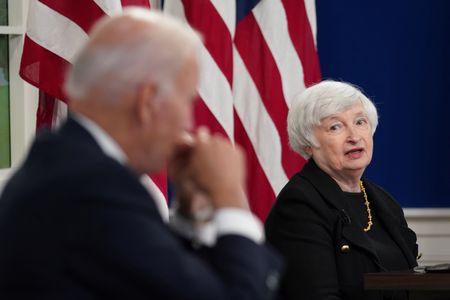 1
1 1
1

WASHINGTON (Reuters) – U.S. Treasury Secretary Janet Yellen said on Friday the Biden administration’s economic agenda will not only expand the productive capacity of the U.S. economy, but can propel faster growth by reducing economic and racial disparities.
In remarks to a Stanford University economics conference, Yellen provided more details on the approach she has branded “modern supply-side economics,” which incorporates the key elements from the Biden administration’s “Build Back Better” agenda: investments in child care, education, job training, infrastructure and healthcare.
Despite a strong recovery from the COVID-19 pandemic, Yellen said sluggish growth forecasts in coming decades due to an aging population mean that a model is needed.
“These facts suggest the need for a policy approach that fosters greater equity across places and races while, at the same time, propelling faster aggregate growth,” Yellen said.
She said her modern supply-side economics concept — a new twist on the Reagan-era term associated with “trickle-down” economics driven by tax cuts — aims to expand U.S. growth potential through investments in boosting productivity, such as more research funding, coupled with an expanded workforce, through better education and child care funding to draw more women into the labor force.
Yellen introduced the concept in January during the World Economic Forum
But instead of having those benefits flow to a limited number of booming cities and wealthy communities, Yellen said the Biden administration’s plans would ensure that “disadvantaged communities and racial groups receive an adequate share of investments in both physical and human capital.
“Such an approach yields larger aggregate gains under the basic economic premise that returns to investment exhibit diminishing returns,” Yellen said. “In the context of investments in people, directing public resources to children and to workers who have received less education and training can yield the largest bang for the buck — and a return that can last decades,” she said.
(Reporting by David Lawder; editing by Jonathan Oatis)